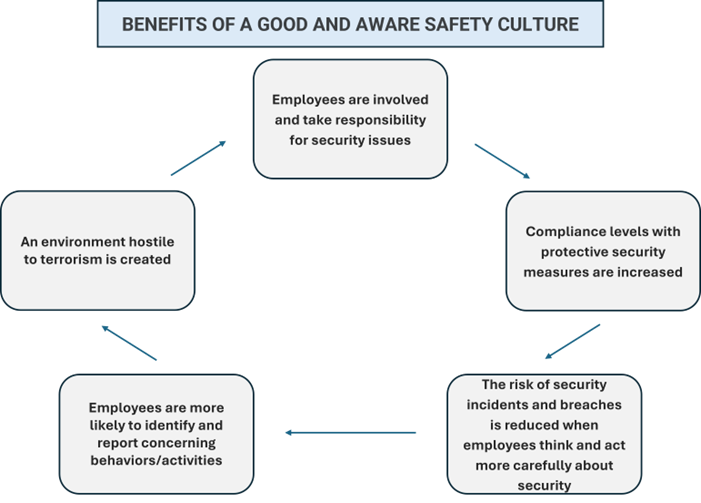The term Security refers to the set of measures and resources aimed at preventing and combating illegal acts that may compromise the safety of civil aviation.
Principles of Airport Security Policy
To protect passengers, crews, staff and the public, cargo and airport infrastructure from harmful events caused by unlawful acts directed against civil aviation.
Intervention logics
The intervention logics are aimed at the following aspects:
- prevent and counter intentional threats to the safety of passengers, crew and airport infrastructure;
- prevent prohibited articles from being introduced or acts of unlawful interference to be committed in the airside area of an airport or on board an aircraft;
- the need to give priority to operational security before anything else;
- obligation to maintain security standards for all operators, companies and external parties operating in any capacity within the airport premises;
- maintenance and improvement of the level of security achieved through periodic and systematic auditing and risk assessment processes;
- constant awareness-raising and communication action so that any event that could have an impact on security is reported and subsequently examinated;
- make people aware, responsible and actively involved in security matters, so that with their virtuous behavior they contribute to the maintenance of a solid airport system.

SEA, as the Airport Operator, believes that staff training plays a primary role in achieving/maintaining professionalism, which in turn is a determining factor in achieving/maintaining the highest levels of security.
Value of security
It is necessary to become aware of the importance of security and it is essential that there is honest and open communication regarding security issues, so that people feel comfortable in promptly reporting any anomalous or suspicious situations.
To report those events caused by unexpected situations and/or failure to comply with regulations, rules or procedures, which can therefore produce a security incident, airport staff have the Airport Security Report at their disposal.
Purposes of Security:
- Preventing and countering intentional threats to the security of passengers, operators, crews and airport infrastructure
- Prevent prohibited items or unlawful interference from being committed at the airport or on board an aircraft
- Ensure the maintenance of security standards for all those operating at the airport by periodic and systematic auditing and risk assessment processes
- Make people aware, responsible and involved in security matters, in order to contribute to the maintenance of a solid airport system
- Carry out constant awareness and communication so that any event that may have repercussions on security is reported and subsequently examined
In order to ensure these activities, the Airport Operator's Security Structure undertakes to:
- ensure the efficiency, effectiveness and quality of the services provided under the concession, with particular reference to security checks on persons, luggage, transported objects, supplies and vehicles entering security restricted areas, as well as on airport infrastructures and security equipment
- ensure a continuous review of operating processes and procedures to achieve the highest possible compliance with national and international regulatory requirements on security
- implement systematic, recurrent and adequate training of the staff in charge of security checks, as well as to raise awareness of the safety of all staff working at the Airport
- promote the culture of safety, understood as values, attitudes and behaviors that must be disseminated to all airport operators regardless of the task, in order to experience security as a benefit and not as a duty
- ensure a safety management system that is based on effective communication of the parties involved, in order to ensure adequate and timely countermeasures
Prevent and counter intentional threats to the safety of passengers, crews, people and airport infrastructure.
This is the objective of Aviation Security, which adopts a set of measures and strategies that today play a crucial role in the management of global air transport.
Furthermore, these measures are not "immutable", but rather are subject to continuous updating and revision, as well as implementation, a sign of a continuously evolving sector.
In light of the above, the Manager develops the safety policies and objectives that it sets itself in managing airport safety.
The objective of the ASR is to collect information relating to security incidents, to learn lessons from and to analyze and mitigate the identified causes (infrastructural, organizational or procedural).
The ASR is an indispensable tool that provides the Security Manager with information regarding security-related problems that have occurred in the airport environment.
From the processing and analysis of the data received, the Security Manager department can deduce problems relating to airport security and provide the right feedback on system performance.
The security culture is a set of norms, attitudes, practices and values, which must be developed and disseminated, so that security is seen and experienced as a value, not as an obligation.
Every employee, operator and individual must feel an active part, committing to integrating the philosophy of the culture of safety into every daily practice of their work activity.
It is necessary to become aware of the importance of security and it is essential that there is open and honest communication regarding security issues, so that people feel comfortable in promptly reporting any anomalous or suspicious situations.
Suspicious events and behaviours
- People who show obvious signs of nervousness, fear, unusual sweating
- People who show obvious signs of malaise, drunkenness, mental alteration
- People who insistently ask for confidential information about security procedures
- People who are in areas they do not have permission to access
- Colleagues or employees who adopt abnormal or suspicious behavior, or who express illegal intentions
- Security incidents (e.g. unattended luggage, forcing doors, queuing attempts...)
Security culture benefits
- Employees are involved and take responsibility for security issues
- Compliance levels with protective security measures are increased
- The risk of security incidents and breaches is reduced when employees think and act more carefully about security
- Employees are more likely to identify and report concerning behaviors/activities
- Employees feel a greater sense of security
- An environment hostile to terrorism is created

It is important to follow continuous awareness of current threats, in particular those related to insider threats and the ways and procedures to manage them effectively.
Insider threat is a harmful threat to an organization, which comes from people within the company, such as employees, former employees, contractors, or business associates, who have privileged information related to the organization's security practices, data, and computer systems.
The insider threat, in the airport environment, can therefore derive from employees and colleagues who may have become radicalized, or be subjected to coercion or with economic difficulties such as to make them willing to carry out an illegal act.
The process of radicalization is not necessarily linear, and radical positions on political, religious or ethical issues are in themselves neither illicit nor necessarily dangerous; they become so when the subject becomes convinced that violence is the only way that can be pursued to affirm one's beliefs.
A solid «Security Culture» allows staff to identify and report behaviors or activities that may threaten security, thinking and acting in a more aware manner and consequently improving the general level of protection, even against what may be an internal threat to the civil aviation sector; the involvement of all airport personnel is necessary to mitigate and counter such a threat.
Promoting a security culture therefore means being aware that security cannot ignore the human factor, awareness of one's work role and motivation, but above all it means understanding that security is everyone's responsibility.
Link to ICAO website – Security Culture Video Campaign: Security Culture Video Campaigns
The Security Incident Reporting System information sources include:
- reporting of possible or confirmed security incidents
- security researches
- audits/observations
- internal investigations
- possible implementations of security measures
- verification of the effectiveness of new security measure
Value of security
It is necessary to become aware of the importance of security and it is essential that there is honest and open communication regarding security issues, so that people feel comfortable in promptly reporting any anomalous or suspicious situations. To report those events caused by unexpected situations and/or failure to comply with regulations, rules or procedures, which can therefore produce a security incident, airport staff have the Airport Security Report at their disposal.
Airport secutity report
The ASR is a fundamental tool for identifying and monitoring possible risk situations for airport security, in order to implement adequate preventive measures to reduce the possibility of such events repeating; it is essential to provide the Security Manager with information regarding security-related problems that have occurred in the airport environment.
The objective of the ASR is to collect information relating to security incidents, to draw lessons and to analyse and mitigate the identified causes (structural, organizational and procedural).
The information transmitted with the reports will be immediately analyzed by the Security Manager structure for evaluation, possible communication to the Competent Authority, and, if necessary, for the activation of appropriate measures. It is the responsibility of all airport operators to report possible or confirmed security incidents using this form.
Before filling out the ASR, following an event that has compromised or could compromise airport security, immediately contact the SEA Security operations center:
- SEA Security Linate +390274852280
- SEA Security Malpensa +39 0274862999
- Useful phone number Linate Polizia di Frontiera +39027021111
- Useful phone number Malpensa Polizia di Frontiera +390274867553 o +390274867552